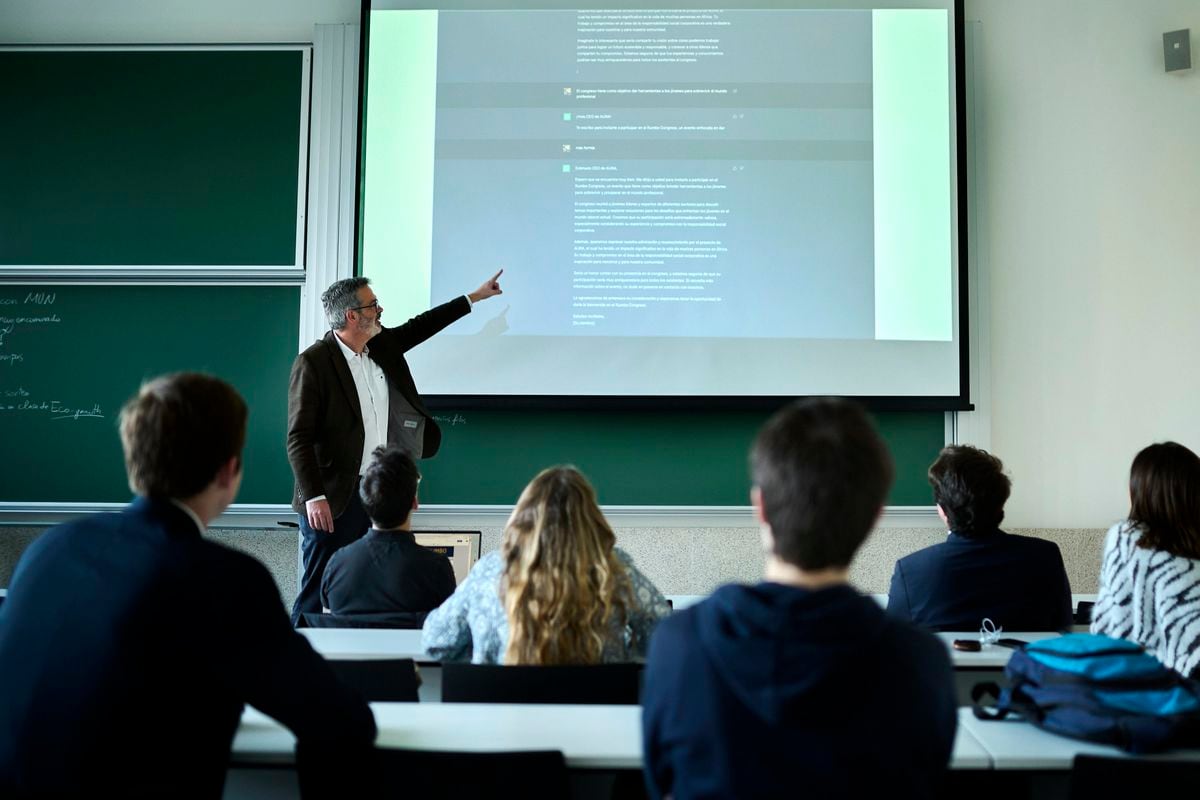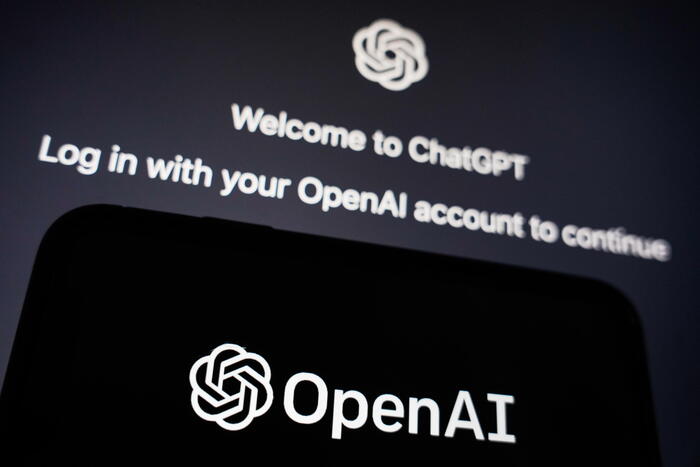"The first day I burned the warehouses," says Francesc Pujol, a professor at the University of Navarra.
“In the first session of the semester I said: welcome to this subject, there are quite a few jobs and you are going to have to use ChatGPT for all of them”.
With this initial sentence, Pujol could no longer back down.
He had to redesign all the tasks to accommodate the new great AI-powered tool, ChatGPT, which is in widespread use.
“When I presented my plan to all the classes, 90% didn't know what it was,” says Pujol.
"I stayed frozen.
Although today it has changed radically”.
Pujol teaches economics, business and design students.
He believes that his strategy has an obvious advantage: “Because I dared to do that first, the students have come to ChatGPT because of me.
So they haven't used it against the system first, but from it."
"With this invitation, his way of working has not been like
pirates on the assault
," he assures, just to save himself tasks and solve homework the easy way.
Education is one of the most obvious and potentially disruptive uses of ChatGPT.
Although it now has a paid option and the free one is more limited, the variety of applications with similar functions is already unstoppable: ChatGPT summarizes long lessons in perfect Spanish, uses simple words to explain complex problems and writes texts with the main points of theories. philosophical.
It is ideal for doing homework, answering questions and writing essays, formulas or even computer code.
"They are going to give us a 10"
In conversations with a dozen teachers and students, EL PAÍS has verified how, in just a few weeks, it is difficult to find centers where a teacher has not mentioned it, feared it, or a student has not been surprised to see how it facilitated their work.
"In the project group we all knew him, except for one girl, and for work he was incredibly useful," says a 17-year-old student from Madrid, who asks not to reveal her name.
“They'll probably give us a 10 because of that,” she says.
The work was a business plan and the students could not think of weaknesses, strengths, possible clients.
“We asked ChatGPT to elaborate it and the truth is that we copied everything, although we removed some examples that seemed too elaborate to be ours.
But nothing more, ”she explains.
In this student's class they quickly found another type of use: “I know that in the course it is quite widespread to use it to make summaries of history and language for selectivity.
They give us the topic, which is usually 3-5 pages, you copy it to ChatGPT and tell it to summarize it in 50 lines, you take all the work out of summarizing it yourself and they are very good summaries”, she says.
The teachers know it all
The most likely certainty is that the use of applications like ChatGPT is going to spread.
Then each teacher will choose their path and have their tricks in their drawer to deal with the impact without having to forbid it: "Since the beginning of time, every time a new
copying
method has emerged , we have caught it and remedied it", says Jesús Mañá, a recently retired teacher from the Fray Pedro de Urbina Institute in Miranda de Ebro. “A teacher knows what level of language each kid uses, so it is very easy to see if they have written it or not: adjectives, concepts, expressions,
omnibus
words
.
Hence the usefulness of oral tests.
Mañá believes that he will improve "for sure or provide more knowledge, if they are accompanied or guided."
"Making chops has always been the best learning to synthesize, the problem was getting them out," he adds.
The subtle way to introduce the presence of ChatGPT in the classroom seems like a common technique: if the teacher says that he knows it, the students will be less likely to use it as a trap.
“I tried not to be suspicious by asking if they knew him,” says Lola Torres, a language teacher in Barcelona.
“That way they also knew that I knew what it was,” she adds, “I proposed a couple of activities for them to indirectly see that I knew.
I know the tool and we are going to use it in class so that they get more out of it”.
The way to take advantage is one of the mysteries.
Pujol, from the University of Navarra, sees two clear options when considering its use: as a substitute or as a collaboration.
“The invitation I make to the students is that ChatGPT can take them much further if they take into account these two options: one, that ChatGPT takes you to the results much faster, but that you learn less or, two, that you use it to learn better.
If it replaces your work, it annuls your ability to think independently, to analyze, to search.
If it accompanies you in this process of critical thinking, of reflection, you will be able to put your capacity for analysis in a higher dimension”, the teacher develops.
is also wrong
ChatGPT often gets things wrong or confuses concepts, despite giving a seemingly convincing answer.
A 20-year-old VET student from Navarra explains to EL PAÍS how ChatGPT helped him get an 8, but his help was scant: "I asked him for 200 words about a vacuum test in a refrigerant installation," he says.
“He explained it as superficial, not exactly what I would like to have read.
It is a specific issue in the cold storage and air conditioning sector, so they still don't have much idea about it”, he explains.
Only his own knowledge allowed him to improve ChatGPT's response.
“For technical things, you must know the subject you are asking about,” he explains.
Each subject will see the appearance of ChatGPT as a different threat: asking for an exercise with verbs in English (they abound) is not the same as asking for a description of the precise operation of a radiator that is only sold in the Canary Islands.
Román Álvarez, a philosophy professor at the Jaume I Institute in Salou (Tarragona), describes this novelty as follows: "ChatGPT is for the rest of the subjects what Google Translator was for English," he says.
Álvarez wrote an email to all the teachers at his center.
He had been testing the app and wanted to warn his teammates before it was too late: "Either we ride the wave or it sinks us", was his intention.
“There have been people who have thanked me,” he adds.
There is no unanimous answer when these teachers are asked by their colleagues, although those who are less used to it try not to look: “They are going through phases of mourning.
Many are in the denial phase, which is looking for mistakes, look how stupid, how horrible”, says Pujol.
Students know what they are doing
Álvarez has sent his first homework with ChatGPT: ask questions for the machine to answer as if it were Thoma Kuhn, a philosopher of science.
The first day he talked about ChatGPT, Álvarez wrote it on the board and asked who knew him: "We were very surprised," says one of his students.
“We had gotten used to hearing other teachers talk negatively about the web, so the fact that one of them told us to use it was strange, we found this way of using the chat interesting too!
It was one of the philosophy classes in which we paid the most attention”.
The caution or unease of some teachers contrasts with this quiet enthusiasm of the young.
His natural knowledge of the advantages and limitations of the tool is remarkable.
This is how Enrique Muñoz, 23, who is studying a higher degree in Administration and Finance, explains it: “It allows you to make a script or a base for a topic and there you have already done the difficult part, which is to start.
You just have to go deeper on your own, it's like the training wheels on the bike, they help you learn, but when you take them off, you discover that you can go further.
He used it for a job on the Data Protection law, after "a long time" reading volumes of laws: "I didn't know half of it, so I decided to try it and, to my surprise, it gave me a fairly long text but very easy to understand.
Thus, the large reading continued to exist, but with a basic idea that helped me better understand the subject, ”he says.
teachers have doubts
Some professors are concerned that these ChatGPT "helps" are not correct and will derail the student: "University students are still in a training process to learn to build logical arguments and defend their points of view, and these tools can give them an easy way to skip that step”, says Víctor Pérez Hernández, a professor at the Universidad Iberoamericana (Mexico).
“Although most likely those skills that they will no longer learn, such as writing a coherent and clear text, they will exchange for others, such as giving precise instructions to the machine and properly judging the responses generated by the AI.
We still don't know much about the long-term consequences of this change,” he says.
No one will be an immediate expert and less of a tool that is still in development: "My goal is not to become an expert, nor for my students to be, but to provide them with knowledge that allows them to take advantage of these technologies and that is also useful as more appear." solutions”, says Jorge Ordovás, a professor at the European University.
Pujol will ask for a report with screenshots next to the jobs to see how they have used ChatGPT.
“You start to learn individually, but then in class I will give it a second round with sharing: of the 30 of you who are in class, I show the best practices, look at the questions they have asked and look at how they have redirected it”, he explains.
So he hopes that the requests will improve with the jobs.
Some refined use as an example
The improvement of the use of the tool of each teacher depends in part on their subject and the type of work that the students do.
To Lucas L. Pose, professor of language and literature, it seems to be more of an aid and not decisive for the writing process: “I usually work on it in class, so the writing process becomes something more important than the writing itself.
If they have to describe something, I explain how the description works, its structure and its forms, and then the students put what they have learned into practice.
However, it is not a question of sending a description as a task and bringing it back the next day, but rather they hand out small drafts in which I am correcting the things that I want them to pay attention to and little by little they are preparing a text in a more fruitful way. than if they just handed in a text and got a grade.
So the final result, if they did it with the AI, would have little value in the grade because the bulk of the work has been in class and has been supervised in its process.
The final wording is just the icing on the cake,” he says.
The revolutions are slow and the teachers who see the arrival of this tool with a "healthy skeptical distance" is because they already had a more adapted type of evaluation: "In my evaluation mode, the student must elaborate and think on their own using certain materials ”, says Alberto Ribes, professor of Sociology at the Complutense University.
“So I am not among the apocalyptic and I am not among the integrated.
I see it from a healthy skeptical distance.
It seems to me that it will be one more resource made available to students.
There will be those who make optimal use of this resource and others who will not”.
You can follow
EL PAÍS Tecnología
on
and
or sign up here to receive our
weekly newsletter
.
Subscribe to continue reading
Read without limits
Keep reading
I'm already a subscriber


/cloudfront-eu-central-1.images.arcpublishing.com/prisa/C2KULJLAYVFUFAOF5YJA5PI22I.jpeg)






/cloudfront-eu-central-1.images.arcpublishing.com/prisa/OHXLFBWROJHYTONFRSHBKYUOIU.jpg)